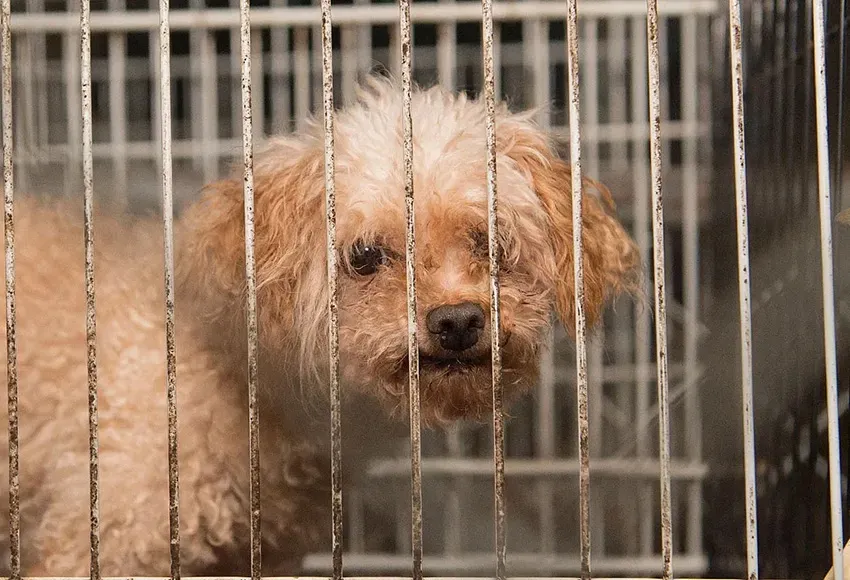In 2023, Washington state passed one of the most comprehensive animal welfare laws in the country. HB 1424, introduced by Rep. April Berg of Mill Creek, is intended to protect consumers by implementing harsh fines on any pet store that imports domestic dogs and cats from unlawful "puppy mills." Washington's previous law barring puppy mills shut down such in-state operations but did not prevent pet stores from obtaining animals from out of state.
Despite earlier laws banning puppy mill operations, many continued to run shady dog breeding businesses under the guise of "backyard breeding." According to PAWS, today, puppy mills are hiding in plain sight. "Puppy mills are commercial breeding facilities that mass-produce dogs (and cats in cat mills) for sale through pet stores, or directly to consumers through classified ads or the internet," PAWS said in a statement. "Roughly 90% of puppies in pet stores come from puppy mills. Many retailers who buy animals from such facilities take the wholesaler's word that the animals are happy and healthy without seeing for themselves."
Just weeks after the bill passed, Gail Oaksmith was arrested in Grays Harbor after years of complaints from neighbors regarding her inhumane breeding practices.
Oaksmith reportedly kept just under the legal limit of 50 intact dogs for breeding purposes on her property. A March 2017 police report showed that an initial investigation found "urine and feces everywhere," and "no food and water visible." A report the following month revealed even more disturbing updates. "[Four] of her dogs (a great dane, [two] red Irish setters, and a small [black] dog) killed her cat on her property," the report confirmed. The reports continued for five years with no action until the passage of Washington's latest animal cruelty law.
"In most states, these commercial breeding kennels can legally keep hundreds of dogs in cages their entire lives, for the sole purpose of continuously churning out puppies," the PAWS statement continued. "The animals produced range from purebreds to any number of the latest 'designer' mixed breeds."
In the year since the passage of HB 1424, Washington has seen a decrease in imported animals via pet stores, but backyard breeders are now just finding other ways around the law. For Oaksmith, it meant keeping just under the minimum number of intact dogs. When the new owners of one of her puppies reported to police that the animal was covered in fleas and suffering from parasite infestations, the law could not be invoked, as the Washington State Department of Agriculture states that it is only unlawful to sell parasite-ridden animals if they pose a threat of spreading to human beings, which is unlikely with dogs.
Since the passage of this law, the state has seen an increase in crackdowns against cruel breeding operations around King County, but other backyard breeders continue to violate the law while police turn a blind eye. In September 2023, 17 doodles were found abandoned near a highway in Whatcom County. County police, tipped off by neighbors, investigated the situation as a suspicious backyard breeder, though no arrests were made. The dogs were in deplorable condition and incredibly fearful of any human contact.
A similar story unfolded on March 30, 2024, when a mother dog was found tied to a tree in Willard, Washington, along with eight purebred puppies. The family was transported to a rescue group 35 miles south, in Oregon, where they were treated by veterinary staff and are currently working on socialization. Once again, no arrests or leads have been made in the case.
These cases continue to stack up. On April 2, a Spokane County judge signed a search warrant to investigate a doodle-breeding operation outside the city. Neighbors reported that the male breeding dog starved to death and was buried in a shallow grave in a field near the home. Police investigated and confirmed that the dog had, indeed, starved to death, with owners claiming they "forgot to feed him." Despite the report, the animals were not removed from the premises, and the owners faced no fines.
Although it's been a year since Washington passed the latest comprehensive animal cruelty prevention law, incidents continue to occur with few to no consequences. Rescue organizations, like PAWS, believe the best way to crack down on cruel animal breeding practices is by fostering and adopting pets from local shelters and decreasing the supply-demand loop that feeds backyard breeders.
One year after the state's new animal abuse law: What's changed?
Share this Post:


